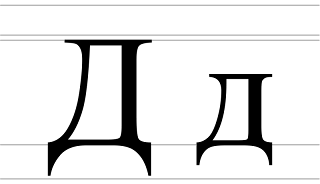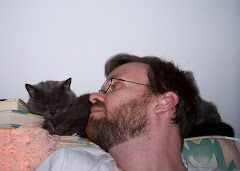 That's a little what it's been like for me since I've started learning the Cyrillic alphabet. Many of the symbols look like things from our Latin alphabet, but they make completely different sounds. So when I'm reading Cyrillic, I have to re-train myself that H makes the "N" sound, P makes the "R" sound, and B makes the "V" sound. And it's not like the H, P, and B sounds don't exist in Cyrillic, they're just represented by X, a table-lookin' thing, and a symbol that looks like a lower-case b with a flag on it, respectively.
That's a little what it's been like for me since I've started learning the Cyrillic alphabet. Many of the symbols look like things from our Latin alphabet, but they make completely different sounds. So when I'm reading Cyrillic, I have to re-train myself that H makes the "N" sound, P makes the "R" sound, and B makes the "V" sound. And it's not like the H, P, and B sounds don't exist in Cyrillic, they're just represented by X, a table-lookin' thing, and a symbol that looks like a lower-case b with a flag on it, respectively.I'm learning Cyrillic because I'm trying to learn Russian, and I'm learning Russian because, well, because of a girl. My new girlfriend is a native speaker of Russian, and since I'm all about linguistics and languages and learning new things, I thought this would be a great opportunity to take on this challenge. Every few years I get engrossed in a new hobby or project that bores and annoys those around me, whether it's German or poker or beer or tennis or blogging. So my latest such project is learning Russian/Cyrillic.
Cyrillic was invented, sorta, by two Byzantine monk/brothers named Cyril and Methodius. (Dude, I am totally naming my next cat Methodius.) They used a mishmash of symbols and sounds from Greek, Hebrew, and Latin, which is why there's just enough resemblance to my own alphabet to fuck me up.
There are 33 characters in the Russian Cyrillic alphabet. About five of them (A, K, M, O, T) share the same sound as their Latin counterparts. Six others (B, E, H, P, C, Y) look like Latin letters, but have different sounds. Some resemble Latin letters that have been written by a Kindergartner or a stroke patient: A backwards 'R', a backwards 'N' or a rounded backwards 'E'. The symbol for the number three (3) also makes an appearance, as the 'z' sound.
 Other symbols allow various levels of comparison with our alphabet. There's a squarish 'U' with a tail, two squarish 'W's (one with a tail, one without), an upside-down lower-case 'h', and an 'I' joined to an 'O' with a horizontal line that makes them look like Siamese twins. And then there are the symbols that don't resemble anything in our alphabet: a Space Invaders spaceship, a table, an 'O' with a vertical line through it, a double-sided K that's often described as a bug.
Other symbols allow various levels of comparison with our alphabet. There's a squarish 'U' with a tail, two squarish 'W's (one with a tail, one without), an upside-down lower-case 'h', and an 'I' joined to an 'O' with a horizontal line that makes them look like Siamese twins. And then there are the symbols that don't resemble anything in our alphabet: a Space Invaders spaceship, a table, an 'O' with a vertical line through it, a double-sided K that's often described as a bug. As if this isn't confusing enough, the written script differs from the printed one. The letter for the 'D' sound, for example, looks like a Space Invaders spaceship in printed form. The handwritten script looks like a capital 'D,' but the lowercase is written like a 'g'. The 'G' sound, meanwhile, is represented by a sorta r-lookin' symbol, but in handwritten script looks like a T (capital) or a backwards s (lowercase.)
As if this isn't confusing enough, the written script differs from the printed one. The letter for the 'D' sound, for example, looks like a Space Invaders spaceship in printed form. The handwritten script looks like a capital 'D,' but the lowercase is written like a 'g'. The 'G' sound, meanwhile, is represented by a sorta r-lookin' symbol, but in handwritten script looks like a T (capital) or a backwards s (lowercase.) If you write out the name Rita in Russian, it looks like Puma. But if it's printed in a book, it looks like: P[backwards N]TA.
If you write out the name Rita in Russian, it looks like Puma. But if it's printed in a book, it looks like: P[backwards N]TA.It may sound like I'm complaining, but I love the challenge. There's a real sense of power in uncovering the meaning behind these symbols, like getting my Lone Ranger decoder ring to figure out the secret message on the back of a cereal box. What once was gobbledegooky gibberish actually has meaning to me now. It's been over thirty years since I learned the alphabet, and now I once again get to experience that sense of discovery, frustration, and accomplishment as I slowly sound out a word on the page. I'm learning to read and write all over again.
I'm usually pretty good at guessing the right consonant symbols, but the vowels drive me nuts. There are eleven vowels in Cyrillic, and Russian has the impudence (like English) to pronounce the same vowel in different ways depending on the word (or even placement within the word.) The O is constantly (but not always) being pronounced like an "ah." So that pivo is pronounced 'piva,' for example. (Or rather, 'piva' is written pivo. It's a chicken-and-egg question.) One of the most common vowels in Russian is a sound that doesn't exist in English, and it's a bitch to pronounce. I always have to scrunch up my face and repeat it like six times before I get it right. (If I get it right.)
Every day I pick a new word to try to write out in Cyrillic. The first word I wrote was "vodka." That's been followed by the Russian words for "thank you", "nonsense", "beer", "chocolate," "tennis", "kiss me", "please", and "repeat." (This has lead to my first Russian conversation with Margaret: Kiss me. Thank you. Please repeat.) I've found myself sitting in meetings and trying to figure out how to transcribe English words on my handout into Cyrillic.
 I've checked out a bunch of books and CDs from the library. Some are more helpful than others. Some books, like Russian for Dummies, turn me off by saying things like, "We're not going to teach you a lot of boring grammar rules." Boring grammar rules!? But that's the best part!!
I've checked out a bunch of books and CDs from the library. Some are more helpful than others. Some books, like Russian for Dummies, turn me off by saying things like, "We're not going to teach you a lot of boring grammar rules." Boring grammar rules!? But that's the best part!!The title I've selected for his blog entry (B3DOP) is my attempt to represent a Cyrillic word in Latin script. Except for the 'D', all the letters look close enough to resemble a Russian word. The word is pronounced vzdor, and it means "nonsense." But I'm slowly starting to makes sense out of it.
.jpg)
No comments:
Post a Comment